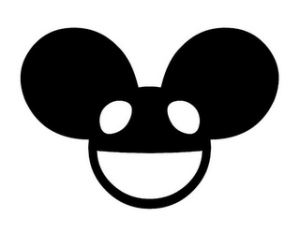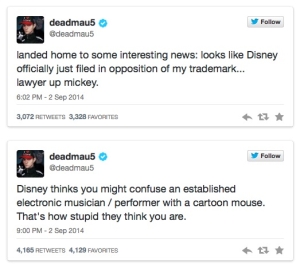Is there room in the trademark world for more than one cartoon mouse? Disney doesn’t seem to feel that there is, and they’ve finally decided to take action against one of the world’s most popular electronic music artists.
Joel Zimmerman is a Canadian musician who performs under the stage name deadmau5 (“dead mouse.”) For at least 10 years, he has worn a mask resembling a cartoon mouse while performing live.

On September 2, of this year, Disney filed a Notice of Opposition before the Trademark Trial and Appeal Board requesting that the USPTO refuse Zimmerman’s application on the grounds that it conflicts with Disney’s famous Mickey Mouse silhouette trademark.
The connection between the images isn’t news to anyone. From a 2012 Rolling Stone cover story about Zimmerman:
As for its similarity to another famous rodent, he’s unapologetic: “Someone at the Disney patent office fell asleep on that one.”
Disney’s Notice of Opposition, of course, included a bit more legalese:
Disney has priority based on its valid and subsisting prior registrations for Disney’s Mouse Ears Marks. In addition, Disney has priority based on its prior use of Disney’s Mouse Ears Marks in commerce in connection with Disney’s Products and Services. Disney used Disney’s Mouse Ears Marks in commerce in connection with Disney’s Products and Services before the filing date of U.S. Trademark Application No. 85972976. Further, Disney has used Disney’s Mouse Ears Marks in commerce before any date of first use that Applicant may establish in connection with Applicant’s Mouse Ears Mark.
Applicant’s Mouse Ears Mark is nearly identical in appearance, connotation, and overall commercial impression to Disney’s Mouse Ears Marks. As shown below, both parties’ marks are comprised of a round head with prominent round mouse ears in silhouette…
Applicant’s Products and Services are identical and/or closely related to Disney’s Products and Services advertised, promoted, offered, and/or sold in connection with Disney’s Mouse Ears Marks.
Accordingly, Applicant’s Mouse Ears Mark so resembles Disney’s prior used and registered Disney’s Mouse Ears Marks as to be likely, when used in connection with Applicant’s Products and Services, to cause confusion, or to cause mistake, or to deceive under Section 2(d) of the Lanham Act, as amended, 15 U.S.C. § 1052(d).
Disney also claimed that Zimmerman’s use would dilute the distinctive quality of Disney’s trademark. Trademark Infringement and Trademark Dilution are separate claims. I’ve written about dilution several times before (including in this blog post), so I won’t reiterate all of the details here.
One interesting point is that Zimmerman filed the application on a 44(e) basis, which means that it was based on a foreign trademark application – in this case, his Australian trademark registration. Under the Paris Convention of 1883, to which both Australia and the US are signatories, foreign applicants (remember, Zimmerman is Canadian) may seek U.S. registration based on an application to register in any of the member countries, with a right of priority if the United States application is filed within 6 months of the date of the first filing of the foreign application.
From the World Intellectual Property Organization website’s Paris Convention page:
Where a mark has been duly registered in the country of origin, it must, on request, be accepted for filing and protected in its original form in the other Contracting States. Nevertheless, registration may be refused in well-defined cases, such as where the mark would infringe the acquired rights of third parties; where it is devoid of distinctive character; where it is contrary to morality or public order; or where it is of such a nature as to be liable to deceive the public. [Emphasis mine.]
I italicized that because, of course, that’s the argument I expect Disney to make. I suppose Zimmerman may be able to claim laches – a legal theory to the effect that (as my regular readers know) the other party waited too long to assert their rights and therefore unfairly prejudiced the party making this claim. To put it in other words, Disney must have known about deadmau5 for quite a while now, so why didn’t they do anything about it until now?
To complicate things even further, Zimmerman now claims that Disney used one of his songs without his authorization or license.
Usually I predict these things will settle, but I don’t see any advantage for either side in making this go away, so we might just have a protracted trademark battle on our hands, folks.


